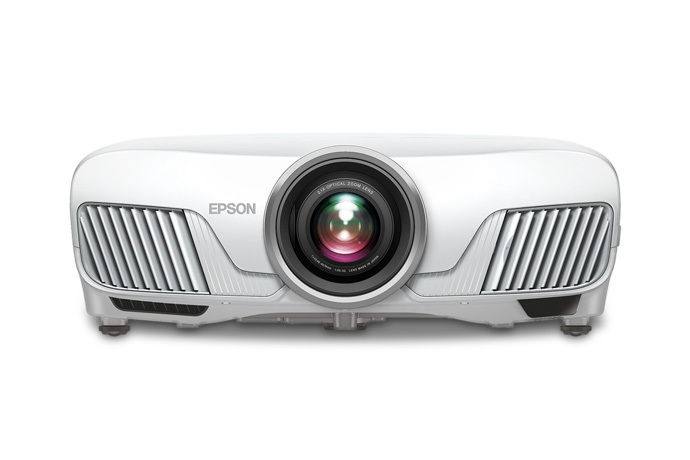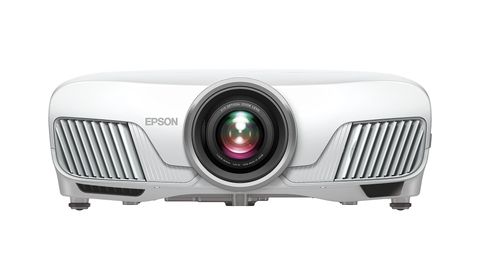

Digital keystone correction alters proper pixel mapping to the imaging panels, producing artifacts affecting picture fidelity. While the Cinema 4010 is equipped with keystone correction, any need for keystone adjustment indicates that physical placement of the projector is somehow amiss. All functions are easily called up from the Home Cinema 4010's comfortable, backlit, full-sized remote control. Delicate, jump-free feathering of image sizing and, more importantly, focus adjustment was quick and precise, governed by a three-axis precision motor that also adeptly maintains screen memory locations with repeatable accuracy. The 2.1X motorized lens is accompanied by ample lens shift, up to +/- 96 percent vertical and up to +/-47 percent horizontal. As a result of previous experience with Epson projectors, I had the Home Cinema 4010 out of the box and delivering a perfectly sized, active image in a mere ten minutes. I positioned the Home Cinema 4010 atop a tall-ish audio cabinet against the back wall in my studio, ideally positioning the lens 21 feet from, and at the vertical center of, my 123-inch diagonal Stewart FireHawk G3 screen. is there something to this conjecture? Can Epson's latest wizardry woo the naysayers? Let the testing begin.Įpson recommends screen sizes from a tiny 50 inches to a highly ambitious 300 inches for the Home Cinema 4010, with 1.35 to 2.84 as the stated throw ratio range.

Attending their CEDIA demo, I sensed Epson's posture as being that UHD does not propel a product past HD designs based singularly upon resolution, though perception in the marketplace perhaps leads projector shoppers to draw such conclusions. At CEDIA Expo 2018, Epson strove to demonstrate the proposition that resolution, while keenly important, is less the key element to image clarity and overall fidelity in a 4K universe than three other major picture components: dynamic range, color saturation, and color accuracy. In almost every instance, improvement was rendered by defeating this feature on earlier projectors that offered it.īut pixels, shifted or not, are not the whole story. Early implementation of this technique left much to be desired, as image detail softened due to the pixels shifting. Said more simply, pixels are asked to do double duty with the signal in a "hand is quicker than the eye" manner to seemingly portray more of them on the screen than possible by inherent design. Competing manufacturers have slowly introduced 4K technology while some still employ signal processing algorithms utilizing pixel-shifting, an attempt at creating the impression of a 4K fill factor from 1920 x 1080 HD imaging panels. Let's find out.įor years, as the race to UHD 4K video unfolded in the consumer front projection marketplace, Sony enjoyed pole position, with no other qualifiers for quite a while.
Epson 4010 cinescope 1080p#
Despite vastly improved pixel-shifting refinement, it's fair to pose the question whether native 1080p in an ever-increasing native 4K projector landscape implies dated technology. Including 3D capability, the Home Cinema 4010 hosts a feature package that belies the $1,999.99 asking price. In Digital Cinema mode, ideal for UHD Blu-ray, Epson claims 100 percent reproduction of the extended DCI-P3 wider color gamut. Ten lens-memory locations store aspect ratio presets, including constant height when paired to a Scope (2.39:1) screen, eliminating the need for a secondary lens.


Rated contrast of 200,000:1, with 3LCD's equal white and color brightness, lights up screens via a dynamic iris coupled with a 15-element, all-glass lens for uniform edge-to-edge brightness. A reworked algorithm for HDR10 tone-mapping with up to 10-bit color depth accompanies 2,400 lumens (700 nits) specified light output from the 250-watt UHE lamp, with a lifespan from 3,500 to 5,000 hours (dependent upon settings). The recently introduced 3LCD design Epson Home Cinema 4010 marches forward with these traits intact, while the 4K PRO-UHD moniker points to improved 1080p pixel-shifting Epson suggests performs perceptibly on par with native 4K projectors (more on that in a moment). In other words: highly accurate calibration results that can get you to the Nth degree of video performance at a very fair price. Their ongoing evolution continues to produce video projectors that-novices take note-are straightforward to set up and easy to use, yet offer so-inclined enthusiasts under-the-hood color science with a logical menu structure. I've always had a particular affinity for Epson projectors, and by Vegas standards I may be tipping my hand at the outset of this review.


 0 kommentar(er)
0 kommentar(er)
